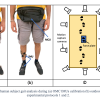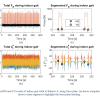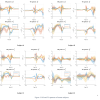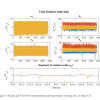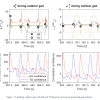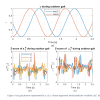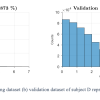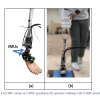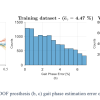Description
Human gait analysis and detection are critical for many applications including wearable robotic devices, rehabilitation robots, reducing or tracking injury risk. We present an experimental protocol to label gait events based on gait patterns of human subjects from two body-worn inertial measurement units (IMUs). Gait patterns are developed using a highly accurate force plate and a motion capture system. Upon defining the gait pattern, human subjects walk outdoors for forty minutes to train and test a PCA-based linear regression model. Gait phase estimation is done using the defined pattern or patterns from other human subjects (increase motion capture and force plate isn’t available). Results showed normalized gait phase estimation error of just 1.81 % for one of the subjects, and an average of 2.21 ![]() 0.258 % for all subjects involved. Results are particularly significantly because proposed work can be expanded to precise control of human-assistive devices, rehabilitation devices and clinical gait analysis. Our future aims to extend this approach to the control of a 2-DOF prosthesis based on a customized gait pattern from the prosthesis user.
0.258 % for all subjects involved. Results are particularly significantly because proposed work can be expanded to precise control of human-assistive devices, rehabilitation devices and clinical gait analysis. Our future aims to extend this approach to the control of a 2-DOF prosthesis based on a customized gait pattern from the prosthesis user.
Cite this work
Researchers should cite this work as follows:
- Soliman, A. K.; Ribeiro, G. A.; Torres, A.; Wu, L.; Heon Lee, C.; Rastgaar, M. (2022). Gait phase estimation using wearable sensors and PCA based linear regression model. Purdue University Research Repository. doi:10.4231/Q0HY-AT09
